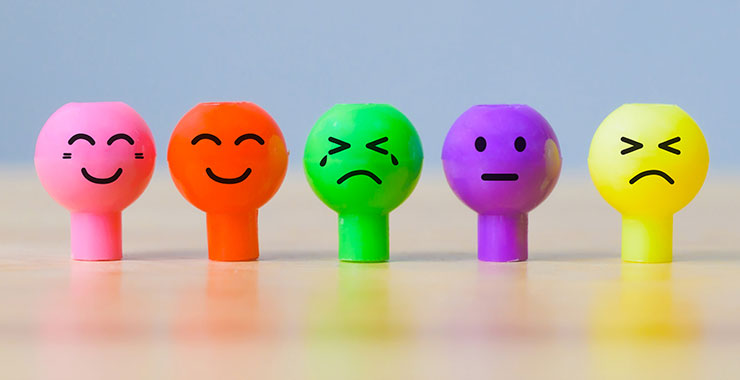Our emotions are not static-sometimes they are elevated, sometimes they are low. But there is a way to regulate them so they do not get out of control. Here are some ways to think about your emotions, and what you can do when you’re feeling emotionally unstable or out of control.
Contents
What Is Emotional Regulation?

Emotional regulation is the ability to maintain emotional stability and to influence what emotions we have when we have them. And how we experience and express those emotions. It is the process of identifying the way we feel at any given moment. And then determining whether our feelings are appropriate considering what is going on around us.
One way to think about emotional regulation is as a skill that we can improve over time with practice. Just like we can learn to ride a bike or play the piano. We can also learn how to better manage our emotions. There are many different techniques that can help us regulate our emotions. But before we get into those, let’s first take a look at what emotional regulation is.
Our emotions don’t necessarily always match up with real events or objects in our environment. You could, for example, be angry at your teacher for giving you a bad grade on the last test even though it’s clear that your score was low because of factors beyond her control. Your emotions may also not always match up with real events in the future. If you are feeling sad about the school play coming to an end tomorrow, you may find yourself relieved after it is over because it means less drama and stress over the next few days.
In these situations, your emotions are a result of what you’re thinking about at that moment. It’s actually pretty common for us to experience different emotions on a daily basis, even if we have no real reason to be feeling that way. But we can’t always trust our emotions and we need to learn when to pay attention and when it’s best to ignore certain feelings that come up.
Signs Of Emotional Regulation

Not everyone has the emotional stability, but some manage their emotions very well. There are a few different signs that can indicate that someone is emotionally regulated.
- One sign is that the person is able to stay calm and in control during difficult or stressful situations. They may also be able to keep their emotions under wraps around other people, only displaying the emotions that they want others to see.
- People who are good at emotional regulation may also seem like they have everything together most of the time. They often have a positive outlook on life and are able to manage their stress and emotions in a healthy way.
- Lastly, people who are good at emotional regulation usually have a good sense of self-awareness and are able to understand why they are feeling the way they are feeling.
Why We Need Emotional Regulation?
There are many reasons why we need emotional regulation. One of the most important reasons is that it allows us to stay in control during difficult or stressful situations. If we didn’t have the ability to regulate our emotions, we would likely become overwhelmed and fall apart when things got tough.
Another reason why emotional regulation is so important is that it helps us to maintain healthy relationships. People who are good at emotional regulation usually have positive relationships with others. They are able to keep their emotions under wraps around other people and only display the emotions that they want others to see. This can be really helpful in situations where you don’t want to show your vulnerability or you don’t want to get into an argument.
Having a good sense of emotional regulation also helps us to have good self-esteem. When we are able to understand why we are feeling the way that we are feeling, it can help us feel more in control of our thoughts and actions.
Benefits Of Emotional Regulation

When it comes to our emotions, we often talk about them in a negative way. We say things like, “I’m so angry,” or “I’m so sad.” But our emotions are actually very important. They can tell us a lot about ourselves and the world around us. Emotions can also help us to make decisions and solve problems.
One of the best things about emotions is that we can learn to control them. We can learn to regulate them. This means that we can make them work for us instead of against us. When we learn how to regulate our emotions, we become stronger and more resilient. We can handle whatever life throws at us.
Some of the benefits of emotional regulation include:
- Better relationships with others
- Fewer experiences of shame and guilt
- Lower risk of depression and anxiety disorders.
- Easier time making decisions and solving problems.
Ways To Manage Emotions

There are many ways to manage emotions. They include self-soothing, talking through your feelings, using music or art to express feelings, distracting yourself from negative feelings, and using your support system.
Self-soothing is a good way to manage anxiety and anger. Of course, it’s not always easy to soothe yourself when you’re feeling really stressed out or very sad. But there are a few things that you can do to help soothe yourself. For example, listening to a song that you really enjoy, going for a walk outside by yourself, going to the movies with a friend, or reading a book.
Talking through your feelings is another great way to manage emotions. This means talking about how you feel with someone else. You can also write about your feelings in a journal or blog or simply talk out loud. This will help you take care of your emotions in a healthy way.
Music and art can also be very helpful when it comes to managing our emotions. For example, a lot of people listen to sad songs when they’re feeling really down because these songs express exactly how they feel. You may also find that putting paint or crayons on a page or screaming into a pillow helps you to manage your feelings.
Distracting yourself from negative feelings is another way that we can learn to regulate our emotions. For example, if you’re feeling really angry and looking for a fight, try watching one of your favorite TV shows instead. Or take up a new hobby like running or playing soccer. This will help you to shift the focus away from the negative feelings so that they don’t overwhelm you.
Finally, using your support system is a great way to regulate emotions because it helps us to feel connected and cared for. When you’re upset, talk through your feelings with someone close to you or call a friend when you need someone to talk to.
Being able to manage your emotions can make a huge difference in your life because it will help you deal with whatever comes up. When we learn how to regulate our emotions, we become stronger and more resilient people who can handle whatever life throws at us.
Steps To Increase Emotional Regulation

There are many steps you can take to increase your emotional regulation skills.
- One of the most important steps you can take is to practice mindfulness. Mindfulness is when you are able to stay focused on your feelings and emotions without judging them or reacting in any way.
- It’s hard not to judge our emotions because we often think that certain emotions should be felt more than others, but it’s actually normal for all emotions to be felt at some point or another.
- You can practice mindfulness by sitting in a quiet room and focusing on your breath for five minutes. After that, try to focus on what you are feeling physical and what feelings come up as a result of those sensations. Try to stay with those feelings without trying to change them or judge yourself for having them. When you are able to handle your feelings in an informed and wise way. It shows that you have good emotional regulation skills.
- Another thing you can do to improve your emotional regulation is to listen more attentively when other people are talking. When we listen attentively, it forces us to focus our attention on someone else and not ourselves. This can also help you to understand where other people are coming from and why they feel the way that they do.
- You can practice listening more attentively by putting away your phone, turning off the TV. And sitting in a chair or on a couch instead of lying down or standing up. Then, look directly at the person who is talking and try to follow along with what they are saying. If you get distracted, bring your attention back to the person who is speaking and stay focused until they finish their sentence or thought.
- Another great way to practice emotional regulation and mindfulness is by keeping a journal. When we keep a journal, we can write down our feelings and not have to act on them in any way. This can be really helpful when you are trying to deal with big emotions like sadness, anger, or fear. Writing in a journal can help us understand why we are feeling the way that we are feeling and it often gives us more perspective on our thoughts and actions. It’s also beneficial because it allows us to take some time to process our thoughts before we act on them.
- Increased self-awareness is another way that you can improve your emotional regulation skills. Self-awareness is when you are able to notice when you are feeling a certain way. And why you are feeling that way. When you have good emotional regulation. It will be easier for you to notice your emotions and understand why they are occurring.
- You can increase your self-awareness by doing simple things. Like keeping a regular journal, practicing mindfulness, and staying in tune with what is going on within yourself physically. For example, if you always get butterflies in your stomach when someone texts you from across the room. That’s a physical sign that you’re feeling nervous and you should probably talk to the person!
It’s important not to judge yourself for having certain emotions or thoughts. But instead, pay attention to your feelings and give them a label.
How To Help Someone With Their Emotions?

Some people find it hard to regulate their emotions. There are some things you can do to help people feel better about their emotions.
Talk
When someone is having a hard time regulating their emotions. It can be really helpful to talk to them and help them understand what they are feeling. Many times, people need someone to just listen to them and not judge them or tell them what to do. Talking solves half of the problem of a person going through something. Because most of the time, all a person needs is someone who can listen to them. Most people do not need someone else to solve their problems.
Identify The Cause
You can also try to help the person by identifying what might be causing their emotions. For example, if someone is feeling angry, you might ask them if something has happened recently that made them feel that way.
It’s also important to be there for the person and let them know that you support them no matter what. You can do this by sending a text, email, or making a phone call.
Do not Overload Them
Most importantly, try not to overload the person with your emotions when they are having a hard time regulating theirs. For example, if your friend is really upset and you’re trying to talk to them about ways that they can change what’s upsetting them, it might not be the right time.
Recommend Things To Help
You can also recommend some of the methods in this article to the person and encourage them to practice them on their own. If they are interested, you can even try some of the methods together. Like talking about your emotions or listening more attentively when they talk.
It’s important to note that as you’re helping someone with their emotions. It is okay for you to express your emotions as well. For example, if your friend just found out that their family is getting divorced. It might be helpful to tell them you are sorry about what they are going through and give them a hug.
Recommend Therapy
Some people find it extremely hard to regulate their emotions. If none of the above things work then suggest them to take therapy. Therapies like talk therapy, psychotherapy, And cognitive- behavior therapy can help people deal with things in a healthy way.
Conclusion
It’s no secret that emotions play a big role in our day-to-day lives. What may be less obvious is the fact that we constantly regulate our emotions. Even if we’re not consciously aware of them. In this blog post, we’ve explored some of the ways in which emotional regulation can affect both our personal and professional lives. We’ve also looked at how different methods of emotional regulation can lead to different outcomes. Finally, we’ve discussed some strategies for managing difficult emotions. It’s important to remember that everyone experiences challenging emotions from time to time. And there is no one “right” way to deal with them.
A Word From Therapy Mantra
Your mental health — Your psychological, emotional, and social well-being — has an impact on every aspect of your life. Positive mental health essentially allows you to effectively deal with life’s everyday challenges.
At TherapyMantra, we have a team of therapists who provide affordable online therapy to assist you with issues such as depression, anxiety, stress, workplace Issues, addiction, relationship, OCD, LGBTQ, and PTSD. You can book a free therapy or download our free Android or iOS app.


